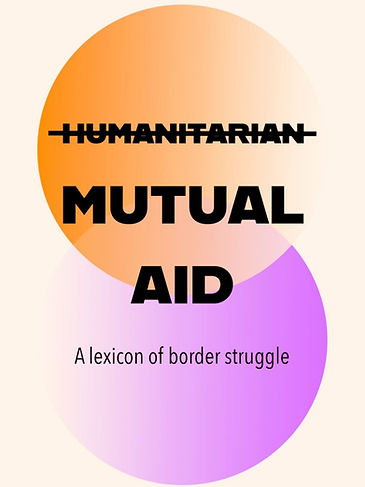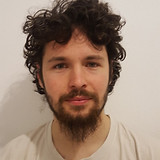
From humanitarian aid to mutual aid: A lexicon of border struggle
SIMON CAMPBELL & OTTO WOLF | 4 JUNE 2022 | OXFORD MIGRATION CONFERENCE 2022

H̶u̶m̶a̶n̶i̶t̶a̶r̶i̶a̶n̶ Mutual Aid is a lexicon exploring activist strategies against the border. It is a living project and dialogue of movements challenging the racialised, classist and heteronormative violence of humanitarianism, and sharing the ways in which different groups are choosing to support each other through mutual aid. The lexicon charts forms of activist organising against the border, practical tools for solidarians, and critical reflections on NGO work, thus prompting us to think through how border abolition can be practised in the everyday. Authored in the round, the collective that are producing the lexicon come from various experiences of activism, border crossing, campaigning and community organising. Each has chosen different words, some projective, others mundane. Varying from ‘Camps’ to ‘Testimony’, ‘Protest’ to ‘Media’, all entries in the lexicon become departure points to consider, rethink and share transformations beyond the border regime. The lexicon is structured as a dialogue between writers, in which different contributors can respond to others’ stories and reflections, thus learning from common struggles. Its testimonies and descriptions address issues like anti-raids, detention visitor groups, community cooking and camp solidarity, among others. We want this lexicon to be a resource that can be distributed amongst campaigns and organisations, providing some tools for and reflections on horizontal resistance, which reconfigures and rejects our position in relation to the humanitarian border.
SOLIDARITY
‘Solidarity is not states banding together to curtail the movements of individuals crossing borders, solidarity is not short-term support to relinquish guilt, solidarity is not a one-way form of exchange from the privileged to those deemed in need.’
This lexicon is the product of conversations about our frustration at both the ways in which organisations will too often co-opt or misconstrue certain key terms within border struggles, and the inaccessibility of critical academic work which allows us to understand them. We recognise the richness of grassroots knowledge being formulated every day on the ground within different activist spaces and movements. This lexicon aims to build on this knowledge to create an accessible and genuinely useful resource for groups working with people on the move and against the border-carceral system. This lexicon is not intended to be a ‘how-to’ guide, as each group will be operating in unique contexts and environments, but it could be thought of as a generative space of some kind. During the recent pandemic, in the UK we saw 4,300 mutual aid groups spring up across the country. However, these groups often represented something very different to the radical, anarchist tradition which that term draws on. Similarly, many organisations working at the edge of national borders often utilise terms such as ‘solidarity’ without interrogating their meaning or importance. Alongside practical resources, this lexicon hopes to provide a conceptual grounding for groups such as these.

The entries in this lexicon and the stories that unfold within them come from a range of contributors and contexts, positioning it as a resource for different groups and struggles to share and draw knowledge. While entries such as ‘Solidarity’ present a conceptual framework for organisations to interpret, entries such as ‘Queueing’ or ‘Food’ may be able to give more concrete examples and advice to prevent groups from falling into problematic practices which may reinforce already pervasive social hierarchies.
TESTIMONY
‘Listening (rather than speaking for someone) prompts us to rethink the role of interviewers and the translation of movement into the language of NGOs, human rights and law. Foregrounding the voices of people who cross borders is not a sidenote, but part of border abolition in the everyday.’
The draft pages of the lexicon already contain practical explanations of the different forms that testimonies can take, as well as examples of all the ways in which testimonies can fall into problematic, extractivist ‘humanitarian agendas which use people’s voices for their own ends’. Alongside this, readers can find examples of good practice, which will hopefully grow as more people and groups add to the discussions.
The lexicon can be useful for those thinking about setting up a new group and wish to avoid the pitfalls encountered by all those who came before them, or it can be provided to members of an existing organisation or collective to ensure that everyone is aware of the framework they are building towards. If, through practice, an organisation or an individual then comes to recognise that something is missing from the lexicon, we would hope to empower them to contribute themselves, expanding upon the work already done.
H̶u̶m̶a̶n̶i̶t̶a̶r̶i̶a̶n̶ Mutual Aid is a process of unlearning and redressing against the humanitarian industrial complex which refracts solidarities through hierarchies of vulnerability and care, making NGOs mere proxies for the state. In its words and pages, we hope to chart both the frailties of our movements when co-opted by such logics, but also the radical potentials for horizontal and transformative action which are already being prefigured beyond these confines.
Call for contributors!
We want this to be an open resource and a living document, for that reason we need you! We are looking for groups and individuals to get involved in shaping and adding to the lexicon. This could be through sending a few lines about a word that interests you, writing a description or a testimony about your experience. It could also be adding visual material and useful links (blogposts, websites, campaign pages, etc.). If you would like to join in, then contact Otto and Simon via otto.wolf@port.ac.uk and sf_campbell@outlook.com.

Simon Campbell
Simon Campbell is an activist-researcher looking at borders, state violence and abolitionist struggles, having been involved in several grassroots collectives supporting people-on-the-move along the Balkan Route. From 2018 to 2021, he was part of the Border Violence Monitoring Network, a regional watchdog documenting pushbacks at European borders. Simon is currently reading an Interdisciplinary MA in South-Eastern European Studies at the University of Belgrade and the University of Graz, with a particular focus on the mobile commons and carceral humanitarianism.

Otto Wolf
Otto Wolf is a PhD candidate at the University of Portsmouth researching organisations that work with asylum seekers and refugees in the UK. Beyond research, Otto is also an activist, working with organisations such as SYMAAG, Akwaaba and Sheffield Against Asylum Evictions in the UK and previously We are Here in Greece and Care4Calais in France. Building on his experiences as an activist, Otto’s research looks to understand how organisations working with asylum seekers and refugees may perpetuate pre-existing structural and social hierarchies and how this can be challenged.




